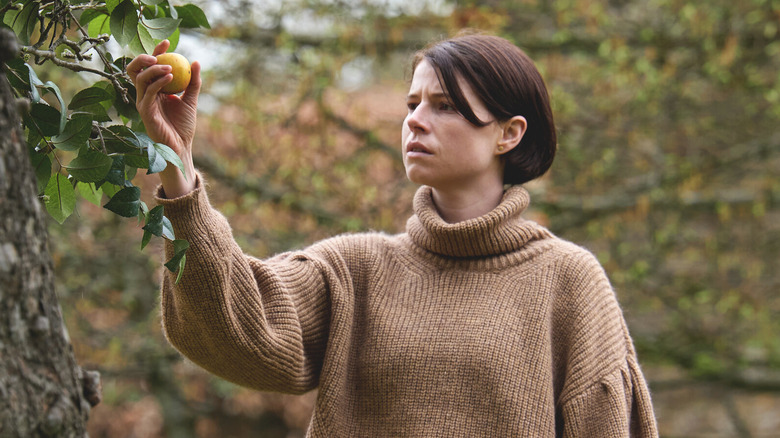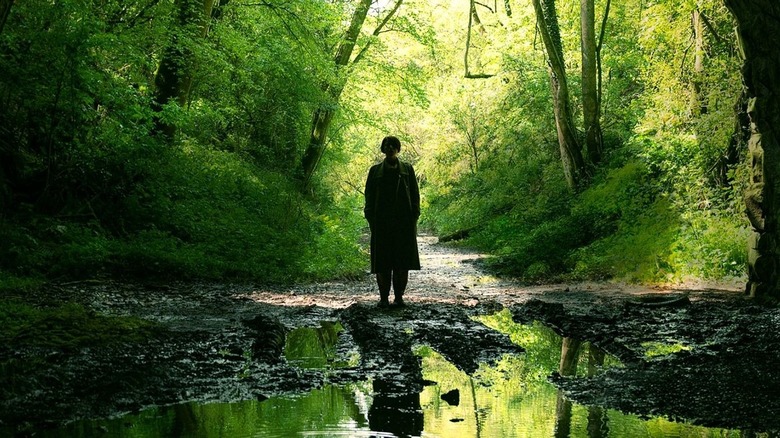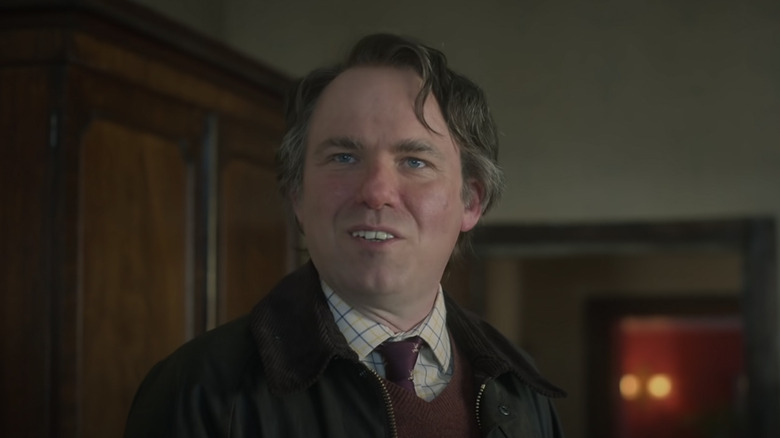Men Review: Terror In The English Countryside
Alex Garland's brand of horror seems to grow more complex and contemplative with each new iteration. The existential terror of "Annihilation," for example, is far removed from the primal zombie genre madness of "28 Days Later," and even non-horror entires in his work, like "Devs," signify a shift towards tonal exploration and images and sequences left up to the interpretation of his audience.
With "Men," his latest horror film and the most overtly scary movie he's made as a director, Garland leans even deeper into the realm of abstraction, contemplation, and ambiguity. It's not that it's a film with nothing to say — Garland makes many, many incisive and interesting observations over the course of the film, helped along by a powerhouse performance from Jessie Buckley. It's that it's a film that's more interesting because of how it says things rather than how clearly it's offering answers to an audience. That's the kind of thing that will irk some moviegoers, particularly those who head to the theaters hoping for more straightforward genre fare. If you're willing to take the ride, though, "Men" becomes an unforgettable, squirm-inducing movie experience, one that lives in your head for days afterward, whether you like it or not.
A doomed retreat
The strange, tension-laden journey of "Men" begins with Harper (Buckley), a recently widowed woman who's decided to rent a rather grand house in the English countryside to get away from the site of her husband's (Paapa Essiedu) tragic death. This death, and the moments that led up to it, hangs over the film like a dark veil, as Jesse remembers the final day of her husband's life and wonders how it all went so wrong.
But bad memories aren't the only thing troubling her once she arrives at the house, a seemingly idyllic country home with an apple tree outside and room after room of beautiful antique furnishings. The landlord, Geoffrey (Rory Kinnear), seems nice enough, but a single walk out into the woods nearby rattles Jessie, as her wandering turns dangerous with the arrival of a mysterious, and distant, man along the path. The less said about what happens next, the better, but suffice it to say Harper's creepy first encounter with the men in the countryside surrounding the house is just the beginning of a dark descent into madness that's part home invasion thriller, part folk horror, and all deeply unsettling.
As the film's trailers reveal, a key ingredient in this discomfiting cocktail of influences and ideas is Garland's decision to cast Kinnear as not just Geoffrey, but every man Harper encounters on her trip, from the bartender at the local pub to the church vicar to a small boy with a bad attitude. It's a visual flourish that adds to the eeriness of the whole piece, and it's helped along by Garland's patient, unflinching approach to the terror that follows Harper throughout the film. It starts with very simple things, like the sudden appearance of a silhouette that wasn't there before, or the flickering of the motion lights outside the house, or even glimpses of figures through windows as they move in on Harper's quiet vacation. By the end of the film, Garland's engaging in some of the most graphic imagery of his entire career, but he's taking the same deliberate, slow-burn approach to the whole thing. This is not a film built on continuous jump scares and jack-in-the-box moments. This is about the horror that's right in front of you — and more importantly, how you choose to face it.
A small, powerful cast
The sense of deliberate, unflinching horror permeating "Men" is complemented by an intimate approach to the storytelling that Garland underlines with a very sparse cast that includes only four major actors, two of them in smaller supporting roles. Much of the film's runtime is left for Buckley and Kinnear to navigate, and each rises to the occasion in their own way.
Buckley plays Harper with a quiet fury, with a sense of the unresolved and the unforgotten hanging over her every move, something that's only amplified when she begins to meet the men of the town in their various menacing forms. Often that menace is quiet, but Harper's seen it before, and the way she reacts is at times equally quiet, making the moments when Buckley swings into all-out fury and even despair all the more effective. She's essentially playing a woman who's moved not just to a haunted house, but to a haunted landscape that may as well be a suddenly alien planet. It's a remarkable performance from one of the best actors of her generation.
Kinnear, of course, has to play opposite Buckley's remarkable work not just as one face, but as a dozen, and he meets that challenge with extraordinary, chameleonic flair. As the title suggests, in many ways he's meant to represent all men, and he offers plenty of variations within that job. The hair and makeup change, of course, as do the voices, but what really sticks with you are the subtle changes in movement and inflection that Kinnear infuses into each of his characters. It might be a strange, out-of-place laugh, or a hand that moves with a little too much freedom, or just a look in his eyes, but each of his men will disturb you in their own way.
With the twin pillars of his stars to fortify his story, Garland is left to forge ahead with one of the most ambitious films of his career, a film that just gets stranger and more disturbing with each passing minute, all building to a climax that you're truly not prepared for, no matter what you think the film is pursuing. It's a remarkably ambitious, and remarkably unnerving, filmgoing experience, one that's bound to stir debate and create divisive interpretations. Based on the film he made, it seems Garland wouldn't have it any other way — and whether "Men" works for you or not, you're never going to forget just how deeply it works itself under your skin.
"Men" is in theaters May 20.


